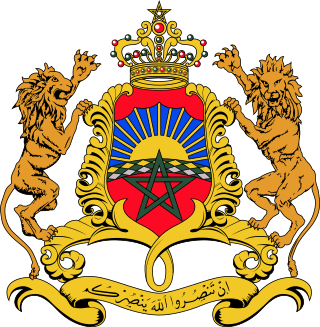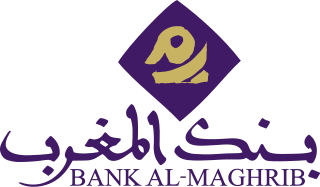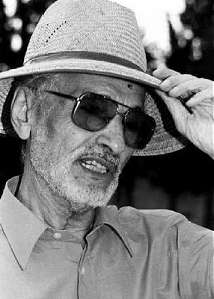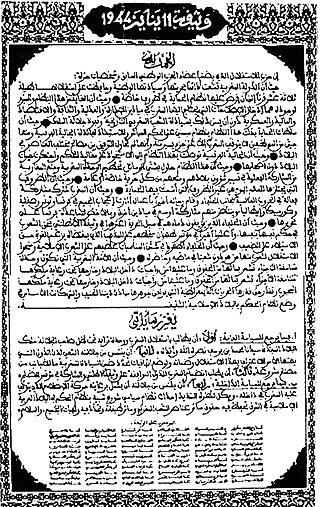History
Founded in 1934 by the nationalist leader Ahmed Balafrej, the M'hammed Guessous School was considered a model institution by Moroccan nationalists. [1]
Built in the heart of the Les Orangers neighborhood in Rabat on land offered to Ahmed Balafrej by his uncle M'hammed Guessous, the school was named in honor of the latter.
Before the end of the protectorate, the school briefly became a French barracks before being vacated by the military upon the founder's return from exile. [2]
In 1975, the school opened an annex in the Souissi neighborhood.
Since 2004, the M'hammed Guessous School has been classified as a "national heritage site". [3]

Driss Chraïbi was a Moroccan author whose novels deal with colonialism, culture clashes, generational conflict and the treatment of women and are often perceived as semi-autobiographical.

Princess Lalla Meryem is the first daughter and eldest child of the late King Hassan II of Morocco and his wife, Princess Lalla Latifa.

The Bank Al-Maghrib is the central bank of the Kingdom of Morocco. It was founded in 1959 as the successor to the State Bank of Morocco. In 2008 Bank Al-Maghrib held reserves of foreign currency with an estimated worth of US$36 billion. In addition to currency management, the Bank Al-Maghrib also supervises a number of private banks supplying commercial banking services. The bank is headquartered on Avenue Mohammed V in Rabat; it has a branch in Casablanca and agencies in 18 other cities in Morocco.
Driss Basri was a Moroccan politician who served as interior minister from 1979 to 1999. After General Oufkir's death in 1972, and then Ahmed Dlimi's death in 1983, Driss Basri became Hassan II's right-hand man and number two of the regime from the beginning of the 1980s to the end of the 1990s. His name has been associated with the Years of Lead.

Muhammad Allal al-Fassi was a Moroccan Revolutionary, Politician, Writer, Poet, Pan-Arabist and Islamic scholar.

Ahmed Balafrej was the second Prime Minister of Morocco between May 12, 1958, and December 2, 1958. He was a significant figure in the struggle for the independence of Morocco.
Since the end of the 1980s, several members of POLISARIO have decided to discontinue their military or political activities for the Polisario Front. Most of them returned from the Sahrawi refugee camps in Algeria to Morocco, among them a few founder members and senior officials. Some of them are now actively promoting Moroccan sovereignty over Western Sahara, which Morocco considers its Southern Provinces. Their individual reasons to stop working for POLISARIO, as reported in the media, vary, but include allegations of human rights violations, monopolization and abuse of power, blackmailing and sequestering the refugee population in Tindouf, and squandering foreign aid. They also claim POLISARIO is controlled by the government of Algeria and as one former member of POLISARIO put it, "[was] a group of Moroccan students who were urging the Spanish colonizer to leave and who had never claimed independence or the separation from motherland Morocco."

Mohamed Chafik, born 17 September 1926, is a leading figure in the Amazigh cultural movement. An original author of the Amazigh Manifesto, he was later appointed as the first Rector of the Royal Institute of the Amazigh Culture. He has worked extensively on incorporating Amazigh culture into Moroccan identity and is a leading intellectual of the Moroccan intelligentsia.

Driss Benhima is a Moroccan businessman. Former chairman of the board and CEO of Royal Air Maroc, the national airline of Morocco.

Cinema of Morocco refers to the film industry of Morocco. Aside from Arabic-language films, Moroccan cinema also produces Tamazight-language films. The first film in Morocco was shot by Louis Lumière in 1897. The first three Moroccan feature films were funded between 1968-1969. Most researchers and critics agree that the history of Moroccan cinema started with Hamid Bénani's Wechma (1970), which is recognised as the first cult movie in Moroccan film history, and received critical acclaim on an international scale. Until then films produced in the country were Moroccanised versions of Egyptian melodramas. Other influential Moroccan films include A Thousand and One Hands, which was the first feature length fiction film of the 1970s.

Mehdi Ben Barka was a Moroccan nationalist, Arab socialist, politician, revolutionary, anti-imperialist, head of the left-wing National Union of Popular Forces (UNFP) and secretary of the Tricontinental Conference. An opponent of French imperialism and King Hassan II, he "disappeared" in Paris in 1965.

Mounir Majidi is a Moroccan businessman. He has been the personal secretary of King Mohammed VI since 2000 and president of the royal holding, SIGER, since 2002. He is also the president of Maroc Culture, the organization behind the Mawazine festival, of the Fath Union Sport (FUS) Rabat, of the Mohammed VI soccer academy, and of the Cheikh Zaid hospital's foundation.
Mohamed Yassine Mansouri is a Moroccan dignitary who has served as the director of Morocco's external intelligence agency, the General Directorate for Studies and Documentation (DGED) under King Mohammed VI since February 16, 2005.
Adil Douiri is a Moroccan politician, businessman and venture capitalist.

The Ministry of Foreign Affairs, African Cooperation and Moroccan Expatriates is the foreign affairs ministry of Morocco, responsible for implementing Morocco's foreign policy and ensuring relations with foreign states.
Driss M'Hammedi was a Moroccan politician and diplomat. He served as minister of foreign affairs in 1960–61.

The Proclamation of Independence of Morocco, also translated as the Manifesto of Independence of Morocco or Proclamation of January 11, 1944, is a document in which Moroccan nationalists called for the independence of Morocco in its national entirety under Muhammad V Bin Yusuf, as well as the installment of a democratic, constitutional government to guarantee the rights of all segments of society. January 11 is an official government holiday in Morocco.

Ahmed ben Mohamed Faouzi, nicknamed Cheikh el-Arab, was a Moroccan nationalist and veteran of the Moroccan Army of Liberation.
Ahmed Piro was a Moroccan singer of Andalusi classical music.













